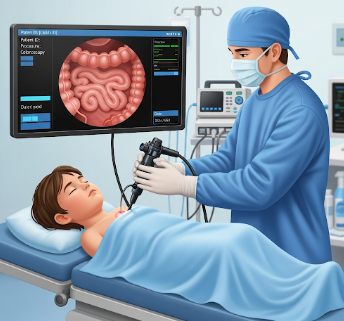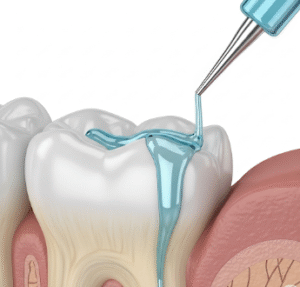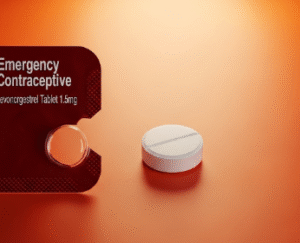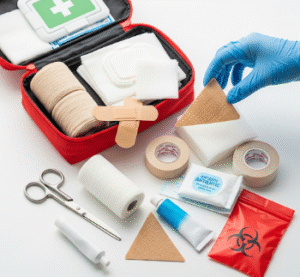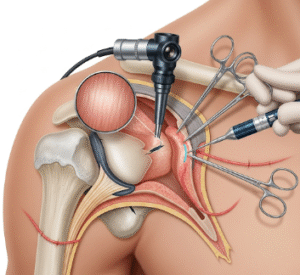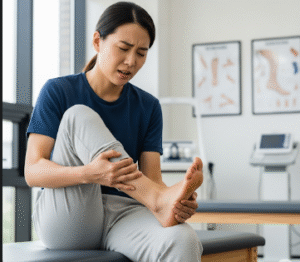Overview
A colonoscopy in children is a specialized medical procedure in which a flexible tube with a camera (colonoscope) is inserted through the rectum to examine the colon and rectum of pediatric patients. It is used to diagnose, monitor, and sometimes treat intestinal conditions, including inflammatory bowel disease, gastrointestinal bleeding, chronic diarrhea, or polyps.
In South Korea, pediatric colonoscopies are performed by highly trained pediatric gastroenterologists using modern, child-sized colonoscopes. The procedure is designed to minimize discomfort, ensure safety, and provide accurate diagnostic results. Hospitals offer comprehensive pre-procedure preparation, sedation, and post-procedure monitoring.
What is Colonoscopy in Children?
A pediatric colonoscopy is a diagnostic and therapeutic procedure for children and adolescents to visualize the colon and rectum.
It allows doctors to:
- Diagnose gastrointestinal conditions, such as Crohn’s disease or ulcerative colitis
- Investigate unexplained gastrointestinal symptoms (bleeding, pain, diarrhea)
- Remove polyps or abnormal tissue
- Take biopsies for laboratory analysis
Key aspects of pediatric colonoscopy:
- Child-sized colonoscope for safe navigation of smaller colons
- Sedation or general anesthesia to reduce anxiety and ensure immobility
- Specialized pediatric teams trained to manage children before, during, and after the procedure
What are the Benefits?
Colonoscopy in children offers important diagnostic and therapeutic benefits:
✔ Early and accurate diagnosis of pediatric gastrointestinal disorders.
✔ Removal of polyps and prevention of future complications.
✔ Ability to perform biopsies for definitive diagnosis.
✔ Minimally invasive procedure with low risk and rapid recovery.
✔ Expert pediatric care in South Korea ensures safety, precision, and comfort.
Procedure Details
1) How should I prepare for Colonoscopy in a Child?
- Medical assessment: Pediatric evaluation including medical history, allergies, and medications.
- Bowel preparation: Use of age-appropriate laxatives or clear liquids to clean the colon.
- Fasting: Usually 6–8 hours before the procedure to reduce anesthesia risks.
- Consent: Parents or guardians receive a detailed explanation of the procedure, risks, and benefits.
- Psychological preparation: Age-appropriate counseling to reduce anxiety in children.
Korean hospitals provide comprehensive instructions and support for both parents and children to ensure optimal bowel preparation and safe procedure.
2) What happens during Colonoscopy in a Child?
- The child receives sedation or general anesthesia for comfort and safety.
- The pediatric colonoscope is gently inserted through the rectum and advanced through the colon.
- The gastroenterologist inspects the lining, and may:
- Remove polyps or abnormal tissue
- Perform biopsies for laboratory analysis
- Treat bleeding or inflammation
- Procedure duration is typically 20–60 minutes, depending on findings and interventions.
South Korean pediatric specialists emphasize gentle handling, high-definition imaging, and patient safety throughout the procedure.
3) What happens after Colonoscopy in a Child?
- Children are monitored until the effects of sedation wear off, usually 1–2 hours.
- Mild bloating, cramping, or drowsiness is normal post-procedure.
- Parents are advised to avoid heavy activity for the remainder of the day.
- Biopsy results are usually available within a few days.
- Follow-up care includes dietary guidance and monitoring for complications.
Risks / Benefits
Potential Risks:
- ➤ Bleeding (especially after polyp removal)
- ➤ Perforation of the colon (rare but serious)
- ➤ Adverse reaction to sedation or anesthesia
- ➤ Mild post-procedure discomfort or cramping
Major Benefits:
- ✔ Early and accurate diagnosis of gastrointestinal disorders
- ✔ Therapeutic removal of polyps or abnormal tissue
- ✔ Minimally invasive and safe procedure for children
- ✔ High-quality pediatric care in South Korea
- ✔ Preventive measure against severe future gastrointestinal problems
Recovery and Outlook
- Immediate post-procedure: Monitoring for sedation effects, mild cramping, or bloating.
- First 24 hours: Gradual return to normal diet and activities; avoid strenuous play.
- Long-term outlook: Colonoscopy allows early detection and treatment of serious conditions, improving long-term gastrointestinal health.
- Follow-up: Frequency depends on underlying condition, age, and biopsy results.
Korean hospitals provide structured post-procedure follow-up and long-term monitoring to ensure optimal outcomes for pediatric patients.
When To Call the Doctor
Parents should contact the pediatrician or gastroenterologist if they notice:
- ➤ Severe abdominal pain or persistent cramping
- ➤ Heavy rectal bleeding
- ➤ Fever or signs of infection
- ➤ Vomiting or dehydration
- ➤ Unusual drowsiness or sedation-related issues
Best Korea Option / Process
South Korea offers world-class pediatric colonoscopy services due to:
- Highly trained pediatric gastroenterologists and anesthesiologists
- Child-sized colonoscopes and high-definition imaging
- Minimally invasive outpatient procedures with rapid recovery
- Comprehensive pre- and post-procedure care, including psychological support for children
- International patient assistance, including translators, accommodation, and scheduling
- Affordable costs with high-quality standards
Top hospitals for pediatric colonoscopy in Korea:
- Samsung Medical Center
- Asan Medical Center, Seoul
- Seoul National University Hospital
- Severance Hospital (Yonsei University Health System)

